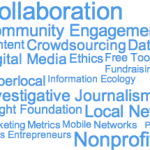Blog:
JA Resource Q&A: The Civic Commons draws a line from online engagement to policy impact

The Civic Commons is designed as a social media environment for civil conversation and action, where the expertise of non-experts contributes to public knowledge. Moulthrop says it’s a form of journalism. “What we’re doing is bringing the public into the conversation in a way that is sophisticated, civil and productive.”

The Civic Commons was conceived as a “social media environment designed explicitly for public good.” Physically based in Ohio, it is an online home for conversation that intersects with news that affects people’s lives. Recent discussions have tackled parental support for public education, gas and oil development, including fracking, civility in public discourse, and drawing new boundaries in a county with 59 municipalities!
The Civic Commons partners with local media organizations to go deeper on stories and tap into a wealth of community knowledge. The JA is also partnering with The Civic Commons, Poynter and Kent State University to put on a series of discussions that will lead to a new ethics guide to best practices in political coverage. We chose The Civic Commons for our series of chats about resources listed on the JA to learn more about how civic conversation can contribute to journalism and deepen reporting on the issues that matter to local communities.
One key goal of The Civic Commons is to explore ways that “journalism can be participatory.” In the JA live chat with Dan Moulthrop, Civic Commons’ curator of conversation, said that meant reconsidering the approach to news coverage so it was “more people, fewer pundits,” and reflected what people really wanted to understand. He made an interesting argument that radio conversations and public forums The Civic Commons put on were journalism, rather than simply community discussions.
In the role of the 4th estate, our job is to be the forum for the elucidation and illumination of the issues that are important to the community, to involve the community in the conversation and to reflect to the community what it’s actually doing. The newspapers are all taking the time to vet candidates through endorsement interviews, but the public isn’t actually invited to do any of the work of that, and many people would gladly participate in that work. Television stations host debates, but mostly those are vehicles for them to showcase how talented their talent is. And also sell a bunch of ads. What we’re talking about is bringing the public into the conversation in a way that is sophisticated, civil, and productive.”
A couple terrific questions that came up in the conversation:
- How do you create a respectful environment for civic discourse where all ideas are heard, yet still provide a mechanism whereby those participants whose contributions are the most valuable naturally rise to the top? – Jim Delli Santi, Spotlikes
- What are your metrics for engagement and success? – Tyler Ahn, Context Partners
“More people… fewer pundits”
 Dan Moulthrop wore many hats before becoming curator of conversation for The Civic Commons. He reported, he hosted a talk show, he taught high school, he taught inmates, he wrote a book. All that counts at The Civic Commons, where Moulthrop says one motto is “more people, fewer pundits.”
Dan Moulthrop wore many hats before becoming curator of conversation for The Civic Commons. He reported, he hosted a talk show, he taught high school, he taught inmates, he wrote a book. All that counts at The Civic Commons, where Moulthrop says one motto is “more people, fewer pundits.”
Moulthrop says ultimate success will be when “when we can draw a line from online engagement to policy impact,” fitting right in to a broad trend of experimenting with ways to have impact and measure it as the news business shifts.
The JA kicks off an experiment this week with The Civic Commons, Kent State University and Poynter: crowdsourcing an ethics best practices guide to political reporting in our divisive, fast-paced world. We’ll start at the Poynter Kent State Media Ethics Workshop then continue the conversation online. What emerges from those conversations will form the backbone of a new ethics guide carried forward by our partners at Kent State.
Join in by sharing examples of reporting you’ve done or seen that raised ethical issues – including civility, accuracy, transparency (in reporting, social media and in campaigning). Listen in on the live stream from Kent State or follow the conference on #ksuethics12, and join the conversations online in the weeks immediately after.
What ethical issues have come up in your political reporting? What would you want explored in an ethics guide to political coverage? Share your examples here!











Weigh In: Remember to refresh often to see latest comments!
0 comments so far.